SALT: Why Eating Too Much Salt Is Bad For Us And How It Affects Our Body!
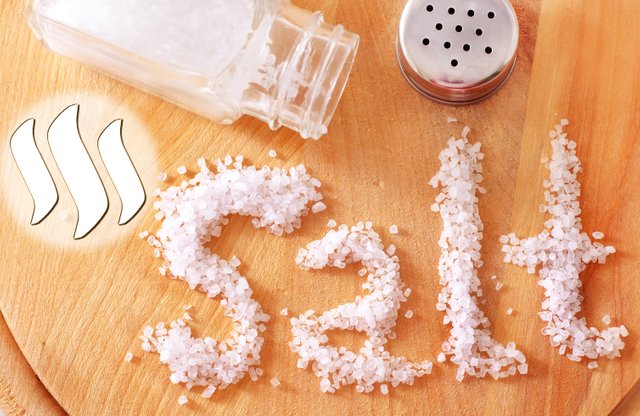
Almost everybody consumes too much salt.
Sodium is hidden in almost all processed foods, and is used way too much in many restaurants as well.
Studies from the Harvard School of Public Health have shown that 99.2% of the population ingests too much Sodium Chloride. And up to 90% of that intake are consumed via the foods we eat!
Too much salt intake is actually the reason for 1.65 million deaths per year.
The study compared date from over 66 different countries, plus 107 additional single studies.
The problem is that salt is Addictive - that's the reason why it's so hard not to finish a bag of potato chips.
But why exactly is it addictive?
We have to look back on our evolutionary history. About 2 million years ago, our ancestors were fighting for survival in the African savanna.
Both salt and water were extremely scarce.
That's why we gradually learned to re-fill our salt and water levels whenever we can- and that's exactly the problem.
When salt is there, we eat it. That's almost like a natural instinct to us, that only few can resist.
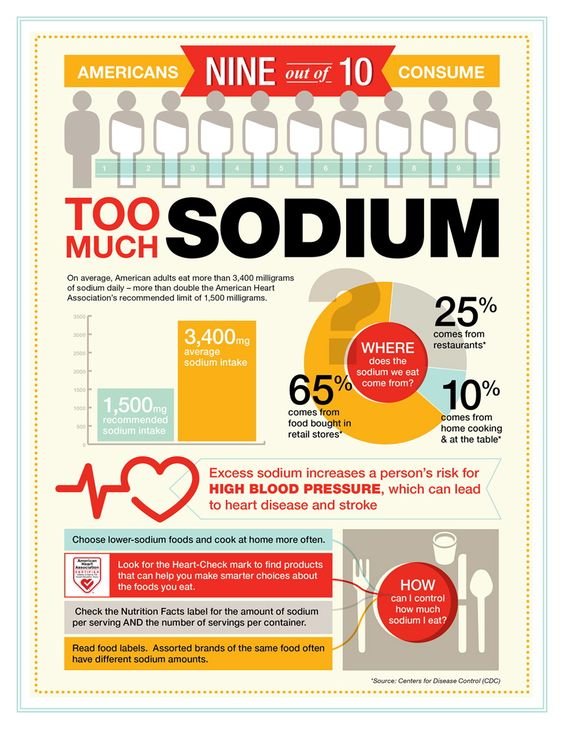
Statistically, humans worldwide ingest around 3.6g salt per day.
But the WHO suggests that only 2g of salt per day should be consumed - anything more than that will be harmful to our health.
And there are big regional differences when we look at salt intake in certain countries - while the average person in an african country consumes quite a low amount of sodium (only 1.5g daily in Kenia), the opposite is true for most countries in central asia (up to 5g daily!).
The US and Europe are placed roughly in the high to middle range of salt intake.
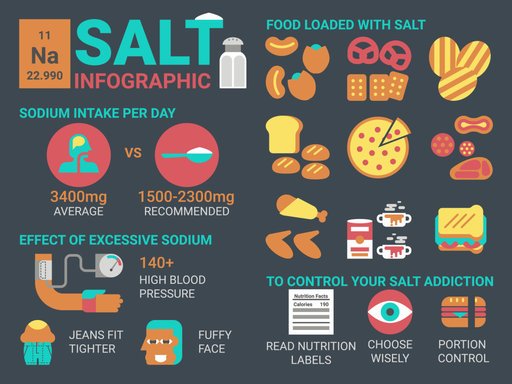
Where in our diet is the salt hidden?
80% of our salt intake are actually a result of eating processed foods, and not just adding table salt to a meal.
We get another surprisingly high amount of salt from bread (27-28%), as well as from meat products (15-21%) and dairy products / cheese (10-11%).
The foods that have been preserved with salt are the ones with the highest amount of sodium, as well as frozen processed foods and instant soups.
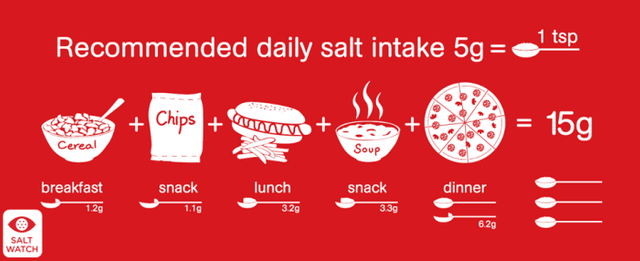
So what exactly does salt do to our bodies?
Salt is especially harmful to our heart.
In General, salt dries out our bodies. But fluids are extremely important for many different functions in our bodies to run smoothly!
Our cells control their water supply mostly through the salt levels.
When we ingest too much salt, a so-called "Concentration Gradient" happens: the level of salt outside of the cell will be higher than inside, which then makes the cell dry out due to the osmotic pressure.
Cardiovascular diseases are very often linked to high sodium intake as well, and elevates the blood fat levels.
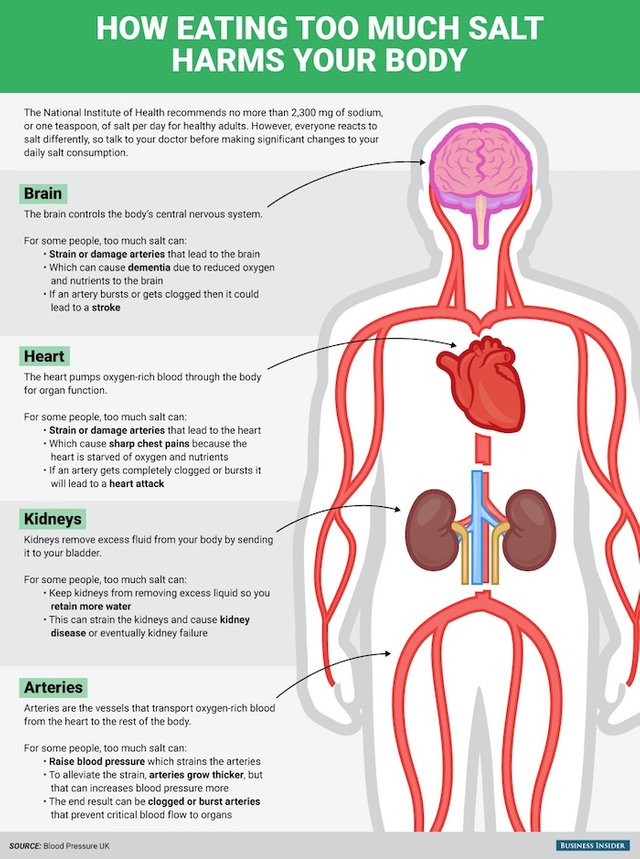
It also has a negative effect on out kidneys.
If we ingest too much salt, a lot of it gets released via the kidneys, which results in a remarkable loss of water.
Another effect of high sodium intake might be raised blood pressure.
The more salt you consume, the more you have to drink in order to balance out the levels of salt and water in your body.
If you don't manage to drink enough, it will lead to vasoconstriction, which in turn elevate the blood pressure.
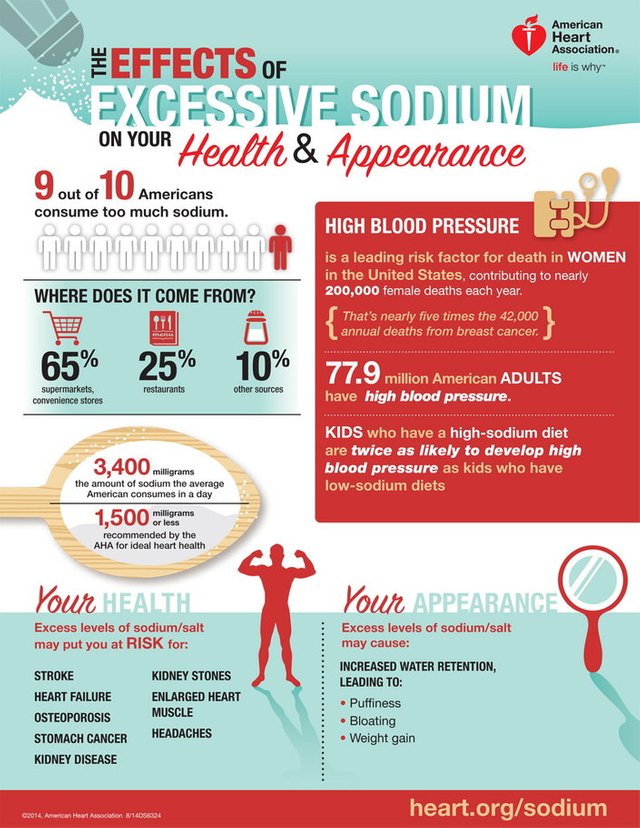
Conclusion
Salt is hidden in almost all processed foods - even where we don't expect it. That's partly the reason why almost everybody consumes too much salt! Salt dries out our bodies and therefore affects our organs negatively - especially our heart and kidneys.
The problem is that salt is addictive and we are hard-wired to eat a lot of salt because it used to be crucial for survival.
Nowadays, there's too much salt in most foods, so it's very important to keep an eye on your salt intake and reduce it as much as possible.
How much salt do you consume?

© Sirwinchester
I remember back in middle school doing the food diary for a day and I was consuming WAYYY too much salt based on that. Little did I know that not a single person in my class was consuming at or even close to the recommended value. I still to this day rarely put added salt on my food, but it doesn't look like that is really enough. Insightful post and I'm glad you wrote about this!
Middle schools were the days of never worrying about salt intake.
Doesn't mean that it is any less damaging though. Salt intake builds up over time not to mention there is likely a correlation between diet as a child and food choices in adulthood. It's why kids with obese parents tend to end up obese as well.
good point, that's true.
Almost everyone consumes too much salt without knowing!
follow me i will you plz
To be fair, more recent science has actually shown that the link between sodium and a lot of the negative health effects listed in this post are actually a lot weaker than previously thought. Sodium sensitivity is also another key aspect to keep in mind. Not everyone is affected the same way.
http://www.ncpa.org/pdfs/Salt-Sensitivity-a-Determinant-of-Blood-Pressure.pdf
Anyone curious about learning a little more about this should take some time and check out this recent study or some other more recent ones.
I would have to agree with you and I generally add salt to my meals.
I would have wriiten this article about sugar or gluten.
Interesting, thanks for sharing!
Wow, what an insightful and well written article! I am a bordering on obsessive health freak and I do watch my sodium but I never really looked into what exactly it does to our bodies! I'm so glad you provided such extensive information so I can be even more conscious of my sodium intake! I do have a question, is pink Himalayan salt lower in sodium? I know it has a ton more minerals than table salt, but I don't know if it safer in regards to sodium.
First of all, thanks for your feedback I'm glad you enjoyed the post!
Good question about the himalayan pink salt - yes you are right about the minerals, that's the biggest factor that makes it healthier. in terms of sodium - it still contains lots of sodium, only that it's not processed and natural. so it's still bad for you in large quantities, but at least a little bit healthier
Its scary how much salt do w mw or any of my family consum then !
And id u think its the same with sugar and almost every single thing that might hurt the body, is pretty much in every single item we eat/day.
Thanks @sirwinchester
Upvotes and will resteem for sure.
Good point, sugar AND salt are hidden everywhere!
Salt is an essential nutrient. The refined form of it sold in supermarkets and put on McDonald's chips is not.
For anyone wanting to learn about good salt vs garbage salt, I recommend this Steemit post from six months ago:
https://steemit.com/food/@kiwideb/the-sorry-story-of-salt-and-how-we-got-fooled-again
Instead of table salt, consume pink himalayan salt! Check out the many health benefits. I take a pinch of himalayan salt everyday with a glass of water!
Excellent suggestion. @rishherbalist
All things in moderation, but salt is not as bad as sugar. Sugar is the worst, in fact salt is an electrolyte and our body needs it to help conduct electrical signals throughout our body.
Yes salt is essential for many reasons, unlike sugar which is just a toxin.
https://steemit.com/food/@kiwideb/the-sorry-story-of-salt-and-how-we-got-fooled-again
I never realized salt was this bad for you. I have a question, why is it, when I got heat stroke a few years back, a parent, who is a nurse, told me to eat something with salt? To bring my BP back up?
Because without salt you die.
Salt is also pumped in to chicken for taste and preparation. Many other hidden salt mines to watch out for lol. I've just started a plant based diet with lots of fresh veggies and fruit. I feel better after just 2 weeks it's quite amazing!
if you replace salt with lemon juice is the best.Also lemon juice is a good electrolyte for the brain.